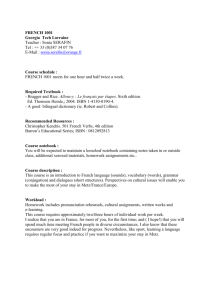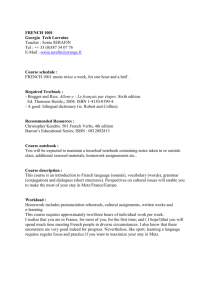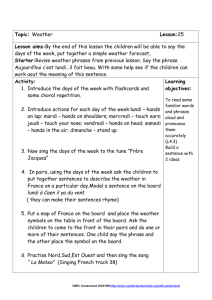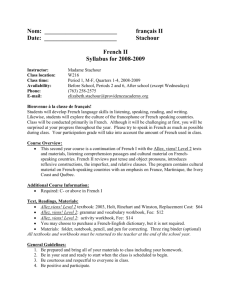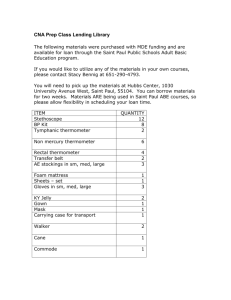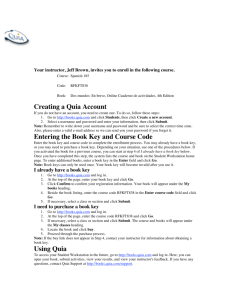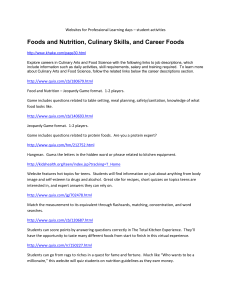french 1002 - Georgia Tech Lorraine
advertisement
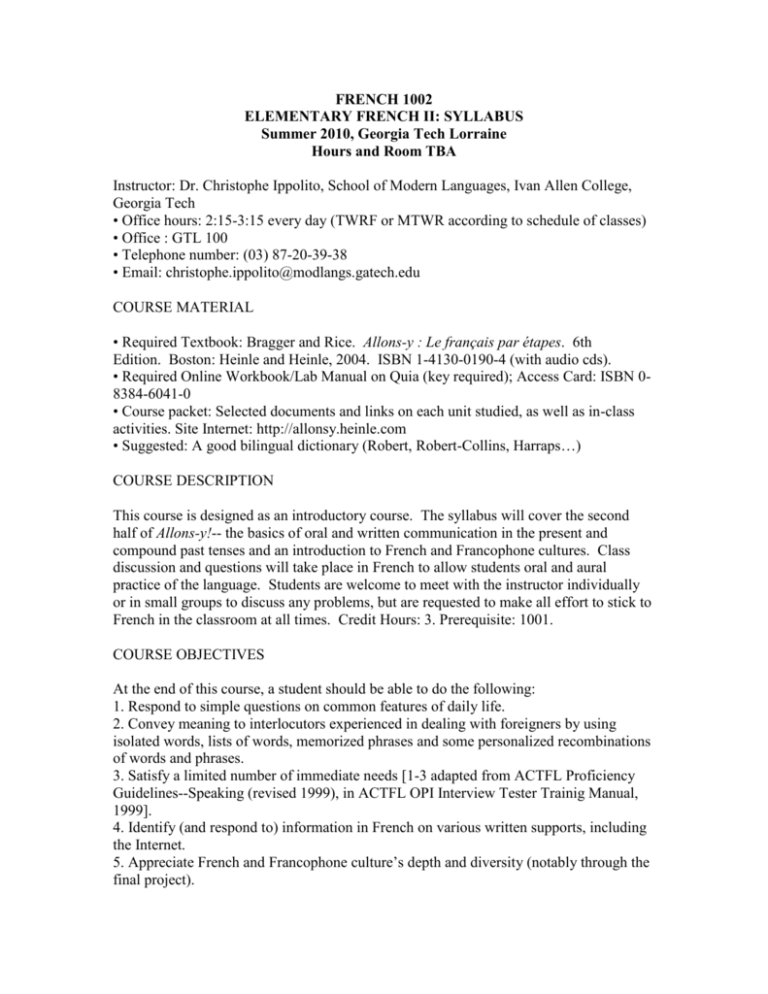
FRENCH 1002 ELEMENTARY FRENCH II: SYLLABUS Summer 2010, Georgia Tech Lorraine Hours and Room TBA Instructor: Dr. Christophe Ippolito, School of Modern Languages, Ivan Allen College, Georgia Tech • Office hours: 2:15-3:15 every day (TWRF or MTWR according to schedule of classes) • Office : GTL 100 • Telephone number: (03) 87-20-39-38 • Email: christophe.ippolito@modlangs.gatech.edu COURSE MATERIAL • Required Textbook: Bragger and Rice. Allons-y : Le français par étapes. 6th Edition. Boston: Heinle and Heinle, 2004. ISBN 1-4130-0190-4 (with audio cds). • Required Online Workbook/Lab Manual on Quia (key required); Access Card: ISBN 08384-6041-0 • Course packet: Selected documents and links on each unit studied, as well as in-class activities. Site Internet: http://allonsy.heinle.com • Suggested: A good bilingual dictionary (Robert, Robert-Collins, Harraps…) COURSE DESCRIPTION This course is designed as an introductory course. The syllabus will cover the second half of Allons-y!-- the basics of oral and written communication in the present and compound past tenses and an introduction to French and Francophone cultures. Class discussion and questions will take place in French to allow students oral and aural practice of the language. Students are welcome to meet with the instructor individually or in small groups to discuss any problems, but are requested to make all effort to stick to French in the classroom at all times. Credit Hours: 3. Prerequisite: 1001. COURSE OBJECTIVES At the end of this course, a student should be able to do the following: 1. Respond to simple questions on common features of daily life. 2. Convey meaning to interlocutors experienced in dealing with foreigners by using isolated words, lists of words, memorized phrases and some personalized recombinations of words and phrases. 3. Satisfy a limited number of immediate needs [1-3 adapted from ACTFL Proficiency Guidelines--Speaking (revised 1999), in ACTFL OPI Interview Tester Trainig Manual, 1999]. 4. Identify (and respond to) information in French on various written supports, including the Internet. 5. Appreciate French and Francophone culture’s depth and diversity (notably through the final project). 6. Last but not least, fulfill his/her own goals in this course, beyond the completion of the language requirement, or the necessary foundations for the major/minor in French: travel? study? potential professional interest? other? Please state your goals as they stand now: a. main goal: b: other goals: COURSE EVALUATION / ASSIGNMENTS 10% Participation and in-class activities including exercises assigned for a specific class; participation required (quantity, quality; French only in class); see attendance/lateness policy for further details. Make a constant effort to participate in each class. 20% Homework: Students will complete online the workbook (WB) exercises assigned on Quia. Late homework will not be accepted. And of course, prepare for good participation in class, presentations, and tests. 20% Essays (7). Prepared in class. They should be typed, double spaced, with a margin of 1.25 inches on all sides. The papers must be your own work. Plagiarism (as defined in the Student Handbook) is banned. Part of the assignment is to learn to proof-read your own work. Accents must be typed in, not written in pen or pencil. These papers cannot be made up since one, your lowest grade, will be dropped. Late papers will not be accepted. All essays have to be posted on T-square, printed and given to instuctor in class. 10% Quizzes. The average of your four best grades (out of 5 quizzes) will determine this part of your grade. These exams will test both grammar and vocabulary acquisition as well as listening and reading skills. Tests cannot be made up. 10% Midterm Examination. No make-ups allowed. Mark your calendar. 10% Final Project (in groups). To be prepared in groups of 3 or 4, the project will address a particular aspect of French and/or Francophone culture to be determined by the students in each group. Each student will present a section of the group project (5 minutes max.). Delivery, originality of the material presented, and sources will be subject to peers’s and instructor’s evaluation. Particular attention will be paid to the coherence of the group project as a whole. Practice and time yourself to 3 minutes. Use any props which will make you talk more interesting and easy to follow for the audience: pictures, maps, charts, realia, etc. Be attentive when taking notes; it is best to put the information into your own words as you are taking notes from your sources. Prepare documentation of your sources to turn it, including Internet sites. Do not read the report. You may have brief notes, but they must be on index cards. Reading a report will result in a reduction of one letter grade on the project. 20% Final Examination. No make-ups will be allowed. Mark your calendar. +10% Extra-Credit Work: This is in no way mandatory. At the end of the semester students may turn a portfolio of their work during the semester. This portfolio should include 2 reworked written assignments, an outline of the section of the final project you’re responsible for, a self-analysis on your level of competence in French and any other material that you consider representative of your work during the semester. COURSE POLICIES: Welcome to my office! Do not hesitate to come and see me as often as you want! You can also take an appointment if the office hours are not convenient to you, or just drop by. Especially, come as soon as you feel you have any problem and/or need help with anything. Take at least two appointments with me to discuss honestly your progress and difficulties. I will make sure your questions, concerns or suggestions get the attention they deserve. I will be happy to inform you on your grades. I will also be happy to help you as much as I can with your homework assignments, your latest essay/project, any issue pertaining to the course, the French program at Georgia Tech, or queries on France and Francophone cultures. When I am not in my office, the best way to reach me is to email me, rather than leave a message on my office voice mail. Attendance, Academic Honesty Your presence and active participation in class is essential. Daily class attendance is required. Please be on time too. Being late once or twice is understandable, but half a point off will be deducted from your final grade for each additional occurrence of lateness. Two unexcused absences allowed (an excused absence has to be documented by a letter from doctor or Dean); one point off your final grade for each additional unexcused absence. Cell phones off in class. Georgia Tech offers accommodation to students with disabilities: please see www.adapts.ga.edu. This course complies with GT Academic Honor Code: please see www.honor.gatech.edu. I am interested in your work, and not in that of a friend or material copied form the internet or any other source. Avoid plagiarism at all costs, and always quote all your sources. Any form of cheating (be it on an essay or a test or any other assignment) is discouraged and will affect your grade. Internet-based tools make it extremely easy today to find out whether somebody pasted material from the internet or other sources. Organization The work on each of the chapters is task-oriented (see schedule below). Prepare these tasks well in advance, especially when you have to present in groups. Visuals are appreciated; use of PowerPoint or web files is welcome. You may always see me before a presentation to discuss what you plan to do or other issues. You need up to an hour a day to prepare for each class session. Read the pages assigned for each day thoroughly. You will have not only to know the material but also to apply it. Use your dictionary (-ies) especially at the end of each chapter to look up for words and their constructions with prepositions used and/or irregular stems (a good dictionary will give you constructions, stems and examples of sentences). Take a study partner and work with her/him, especially on oral activities and presentations. However, the written work given to me should be your own (see above). STUDY TIPS 1. Never miss class. Use every opportunity to speak, hear and read French. Keep on trying to keep a conversation going. This course will use the latest ACTFL-designed techniques in order to enhance your oral proficiency. Be willing to take risks, trying out the new structures and vocabulary you are learning. Students who play it safe (stick to the simple, reliable forms instead of trying new ones) will only hold themselves back. There is no disgrace goofing with something you didn’t know; but progress comes from learning from it and doing better next time. 2. Make a constant effort to participate in each class. The classroom is the primary focus for all second-year work. As you are novice speakers, you should not be afraid to make mistakes. They are a necessary part of the learning process. Never fear to ask for help: often the same thing puzzling you is confusing others too. Get help fast when you need it; do not let problems develop. Take at least two appointments with the instructor to discuss honestly your progress and difficulties. 3. Do not fall behind in your work. Be organized: do your homework in time. ‘Catching up’ is extremely difficult in an intermediate language course. Success depends largely on regular contact with the material (In practicing a skill, four 15 minute-study periods with full concentration may work better for you than one-hour sessions). Don’t be satisfied with knowing the material. Be sure to practice enough times to be able to perform it with relative ease and fluency. Tests examine not only what you know, but how well you know it and how quickly you can put it into use. 4. Watch yourself as a learner: try to determine what type of material helps you learn best and what doesn’t. Ask for help from your instructor. Avoid translation at all costs: you want to develop skills in French, and it doubles your processing time. It is more useful to develop the ability to paraphrase (circumlocute). 5. Design your own learning aids: flashcards, charts, lists, repertories, website, etc. This will help you memorize and recycle the material. Take advantage of cognates while building your vocabulary. Put tricky points on cards to carry with you and take advantage of those mentally idle moments in your day (walking, standing in line, eating breakfast, etc.) to practice the language. Memorize not only vocabulary, but useful formulas you can rely on to get things done. 6. Assume that grammar and syntax do mean something. In Romance languages, among others, place, form and endings of words can make a huge difference in meaning, and have for hundreds of years. Use the hand-outs and the course Internet site on the Blackboard. 7. Practice out loud. Read the material and learn the spelling of the words. Use the website’s suggestions to improve on your speaking and listening abilities. Some of these suggestions come from the Middlebury College Summer Language School Handbook, 1997, the Wake Forest University Romance Languages Home Page and the following individuals: Kara Rabitt, Joan McRae, Lucile Duperron. Also see Joan Rubin & Irene Thompson, How to be a More Successful Language Learner, Heinle & Heinle, 1982, or H. Douglas Brown, A Practical Guide to Language Learning, McGraw Hill, 1989). I am indebted to Dr. Blackbourn-Jansma and Dr. Lionel Gall for their invaluable advice on this course. FRENCH 1002 ELEMENTARY FRENCH I: SCHEDULE The following schedule is subject to changes. Any changes will be announced in class, ahead of time. Should you be absent on a day a change is announced, it is your responsibility to remain apprized of all changes. A detailed schedule will be provided on the first day of classes. In-Class Activities, Readings (to Homework/Devoirs prepare at home) Learning Tips Submit your QUIA online homework by the date due Always prepare the Do the QUIA exercises activities for the day for the day the before class: this will corresponding activities make your learning in the textbook are much more effective planned: this will make your learning much more effective Additional Activities: culture and readings Always prepare the activities in this column and read the texts carefully, using the suggested dictionary as needed semaine 1 mardi 12 mai Introduction Survival French mercredi 13 mai French newspapers, radio, TV Set up your QUIA channels account for the online: list on semester T-square. Prepare questions on Groups: any point of Révisions Chapitres evaluation grammar/vocabulary 1-7 (timeyou are not comfortable permitting) with and post them on Email the T-square forum @ registration https://tfor QUIA square.gatech.edu/portal interculturel : conversation France-USA jeudi 14 mai Chapitre 8 : Soignons-nous ! (305) For each essay, post your preliminary drafts on t-square intercultural issues and travel Première étape : Ça va ? Ça ne va pas ? (306) Practice the material French News (TV, radio) vendredi 15 Deuxième étape : À mai la pharmacie (317) semaine 2 preparation for essay 1: write/post a 1st draft of the essay (G p. 338, describe yourself/your life ten years ago) to bring to class for correction by peers/instructor lundi 18 mai Troisième étape : Pour être en bonne forme… (325) mardi 19 mai Workbook/Lab Point d’arrivée (335) Manual Exercises for Correction of Quia chapter 8 due ch. 8, Ch. 8 review (submitted on Quia by 10 a.m.) jeudi 20 mai Quiz Chapitre 8 Dossiervendredi 22 Découvertes : La mai francophonie (346) find French friends to practice the material, especially pronunciation Essay 1 due (half a page) and posted on Tsquare forum post material and comments on a Francophone country semaine 3 lundi 25 mai Chapitre 9 : Faisons des études à l’étranger ! (351) Première étape : Un programme d’étude à Strasbourg (352) mardi 26 mai Première étape : Un programme d’étude à Strasbourg (352) mercredi 27 mai Deuxième étape : Quelques jours à Present your program in Metz Present a French hotel l’hôtel (362) jeudi 28 mai Deuxième étape : Quelques jours à l’hôtel (362) semaine 4 mardi 2 juin Troisième étape : Chez les Baptizet (373) preparation for essay 2: write/post a 1st draft of the essay (H p. 386, write a postcard) to bring to class for correction by peers/instructor Workbook/Lab Point d’arrivée (385) Manual Exercises for mercredi 3 Review ch. 8-9 chapter 9 due juin Correction of Quia (submitted on Quia by ch. 9, Ch. 9 review 10 a.m.) Essay 2 due (half a jeudi 4 juin Quiz Chapitres 8-9 page) and posted on Tsquare forum MIDTERM Chapitre 10 : Installons-nous ! vendredi 5 (395) juin Première étape : On cherche un appartement (396) semaine 5 Midterm correction Première étape : On lundi 8 juin cherche un appartement (396) Look for housing ads online and post some mardi 9 juin Deuxième étape : On s’installe (404) describe your house mercredi 10 juin Deuxième étape : On s’installe (404) jeudi 11 juin Troisième étape : On invite des amis (411) semaine 6 lundi 15 juin preparation for essay 3: describe a write/post a 1st draft of Troisième étape : On party you the essay (I p. 422, invite des amis (411) attended brochure to advertise a house you're trying to sell) to bring to class for correction by peers/instructor mardi 16 juin Workbook/Lab Point d’arrivée (420) Manual Exercises for Correction of Quia chapter 10 due ch. 10, Ch. 10 (submitted on Quia by review 10 a.m.) Essay 3 due (half a page) and posted on Tsquare forum mercredi 17 juin Quiz Chapitre 10 jeudi 18 juin DossierDécouvertes : Le Québec (428) post material and comment on Quebec lundi 22 juin Chapitre 11 : Cherchons du travail ! (433) Première étape : Les petites annonces (434) post job ads mardi 23 juin Première étape : Les petites annonces (434) mercredi 24 juin Deuxième étape : J’ai besoin d’un costume (452) jeudi 25 juin Deuxième étape : J’ai besoin d’un costume (452) semaine 7 descrive your clothes, choices etc. take an appointment with instructor for proficiency interview semaine 8 lundi 29 juin preparation for essay 4: write/post a 1st draft of prepare Troisième étape : the essay (H p. 246, material for Une interview (471) self-portrait) to bring to an interview class for correction by peers/instructor mardi 30 juillet Point d’arrivée (482) Workbook/Lab Correction of Quia Manual Exercises for ch. 11, Ch. 11 chapter 11 due review mercredi 1er juillet Quiz Chapitre 11 jeudi 2 juillet Chapitre 12 : Voyageons ! (493) Première étape : On prend le train (494) (submitted on Quia by 10 a.m.) Essay 4 due (half a page) and posted on Tsquare forum visit sncf.com semaine 9 mardi 7 juillet Première étape : On prend le train (494) Deuxième étape : mercredi 8 Sur les routes et les juillet autoroutes (510) jeudi 9 juillet study geography of France Deuxième étape : Sur les routes et les autoroutes (510) Troisième étape : Allons au restaurant ! (521) preparation for essay 5: write/post a 1st draft of the essay (I p. 537, write describe your about an unforgettable ideal French trip or meal) to bring to menu class for correction by peers/instructor lundi 13 juillet Troisième étape : Allons au restaurant ! (521) Workbook/Lab Manual Exercises for chapter 12 due (submitted on Quia by 10 a.m.) mardi 14 juillet Point d’arrivée (533) Spoken French Essay 5 due (half a Evaluations page) and posted on TFinal Projects square forum preparation Etude d’un texte, document ou film mercredi 15 juillet Review for Final Correction of Quia ch. 12, Ch. 12 review Spoken French Evaluations Etude d’un texte, document ou film post questions on vendredi 10 juillet semaine 10 jeudi 16 juillet Final Projects preparation grammar and vocabulary for review Review for Final Spoken French Evaluations Final Projects preparation Etude d’un texte, document ou film semaine 11 mardi 21 juillet FINAL PROJECTS PRESENTATIONS mercredi 22 juillet FINAL PROJECTS PRESENTATIONS July 24,25,28,29 FINAL EXAM (RFMT) (TBA)
